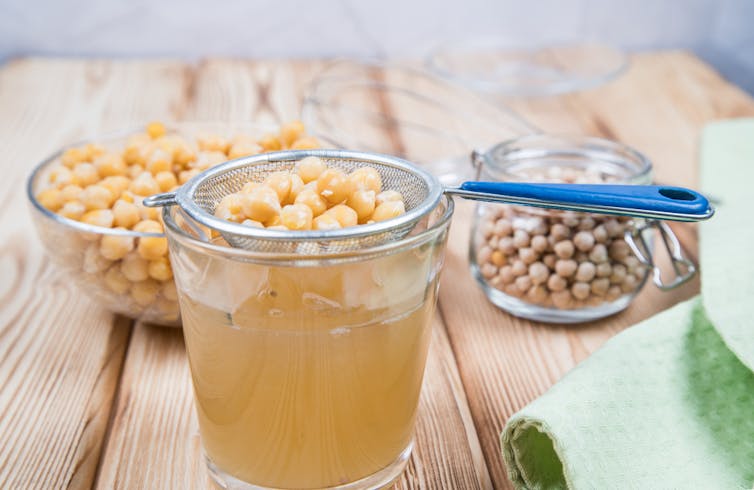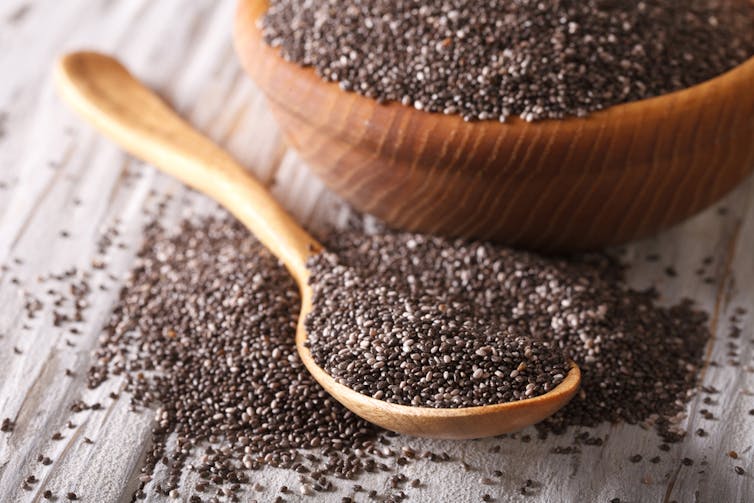Evangeline Mantzioris, University of South Australia
The price of eggs is rising. So many of us may be looking for cheaper alternatives.
First, the bad news. Nothing can replace a boiled, poached or fried egg.
Now, the good news. Lots of other ingredients can make foods puff and rise, give your meal a rich taste, or hold together ingredients.
So try using some of these egg substitutes and save the real eggs for your breakfast.
Why are eggs so popular?
Eggs are incredibly nutritious. They’re a rich source of protein, vitamins A and D, pigments called carotenoids, and minerals.
Eggs are also versatile. We use them to make a range of savoury and sweet foods, sauces and drinks, not to mention breakfast.
Their popularity and versatility lies in the unique characteristics of the two main parts of the egg – the white and yolk. Each contribute different properties in cooking.
Egg yolk is about 55 per cent water, 27 per cent fats, 16 per cent protein (with small amounts of carbohydrate). Egg white is about 10 per cent protein and 90 per cent water, with only traces of fat and carbohydrates. Different types of protein in egg white contribute to them foaming when whisked.
Eggs are versatile
Eggs have a different role in different types of cooking.
1. Eggs are a raising agent
Beaten or whisked eggs act as a raising agent by creating pockets of air in foods, which expand with cooking, making the foods puff and rise. This gives baked products like cakes, biscuits and muffins volume and an airy feel.
Using just the egg white leads to a remarkably light and delicate foam, as we see in meringues. In mousse and souffles the whites and the yolk are beaten separately, then mixed together. This leads to a light, airy and smooth texture.
2. Eggs hold together other ingredients
Eggs combine ingredients and hold them together during cooking. This gives foods – such as vegetable or meat patties – their structure.
3. Eggs bind other liquids
The liquid from eggs binds other liquids from other ingredients in the recipe into a soft, moist and tender mass. We see this in scrambled eggs, omelettes and egg custard.
4. Eggs act as emulsifiers
The egg yolk contains different proteins (livetin, phosvitin) and lipoproteins (lecithin). These act as emulsifiers, allowing fat and water to mix together in foods such as mayonnaise and hollandaise sauce.
5. Eggs boost flavour
The fat in egg yolks helps carry and release the flavour of some fat-soluble components of food. These foods may taste differently without the eggs. Eggs also contribute to foods feeling soft in the mouth.
As eggs have different roles in cooking, you may need different egg substitutes depending on the outcome you want. Here are some cheaper (and vegan) options.
Aquafaba
Aquafaba is the liquid drained from cans of bean – typically from chickpeas as it has the most neutral flavour. This is the all-round winner, especially as most of us probably throw it away without realising what a gem it is.
Aquafaba is versatile. You can whip it up like egg whites to form a foam that can be used to make meringue (even pavlova), gelato, in baked goods, and for binding ingredients in patties. It also contains emulsifiers and can be used to make mayonnaise.

You’ll need different quantities of aquafaba depending on the recipe. Generally, though, you use about two to three tablespoons of aquafaba to replace the volume of fluid from an egg.
On the downside, aquafaba can taste a bit beany. So it is best to use it with stronger flavours to overcome this.
Nutritionally, aquafaba has small amounts of carbohydrate (about 2.6g/100 millilitre), and negligible levels of protein (about 1.3g/100 millilitre).
You can also freeze aquafaba.
Vinegar and baking soda
Mixing a teaspoon of baking soda with a tablespoon of vinegar can replace an egg in most baked goods. This produces carbon dioxide, which is trapped into air pockets, and makes foods rise.
This is a very cheap option, however its success may be limited by how heavy the rest of the ingredients are. This combination also has very little nutritional value.
Commercial egg replacements
These are available at most supermarkets, are very cheap compared with eggs, have a long shelf life, and are easy to use, with instructions on the packaging.
Typically, they contain different starches from potato, tapioca and pea protein (which act as leavening agents and form foams), along with raising agents. They are recommended for use in baked goods. However they have very little nutritional value compared to an egg.
Flaxseed meal and chia seeds
Use either a tablespoon of flaxseed meal, or chia seeds, added to about three tablespoons of water. Allow the mixture to sit for a few minutes to form a gel.
The gels can be used in baked goods, however this option isn’t as cheap as the others, and has a slight nutty taste.
Both these seeds provide nutritional value. They are both rich in the plant-based omega-3 fatty acid called alpha-linolenic acid. We can convert this fatty acid into healthy omega-3 fatty acids, but at a slow rate. These seeds also provide fibre, polyphenols and antioxidants.

Tofu
Tofu, which is made from soybeans, is widely available and fairly cheap. It has the most “eggy” appearance and so makes it ideal as a substitute for scrambled eggs and in quiche. However, you will need to use silken tofu and puree it.
Tofu is highly nutritious and provides protein, fat, calcium, polyphenols and antioxidants.
You could also use soy flour. Add one tablespoon to three tablespoons of water, then use immediately in baking and for binding ingredients together. However, soy flour does not contain calcium, which tofu does.
Mashed fruit
Mashed bananas or apple sauce are also used as egg substitutes. These mainly act to bind and hold moisture in the food and help carry the flavours.
You also get the nutritional value of the fruit. Due to the natural sugar that in fruit, this will sweeten your baked goods so you will need to drop the sugar by about a tablespoon (or more) for each piece of fruit you add.
Evangeline Mantzioris, Program Director of Nutrition and Food Sciences, Accredited Practising Dietitian, University of South Australia
This article is republished from The Conversation under a Creative Commons licence. Read the original article.
Often do you eat eggs? Will you consider any of these substitutes? Why not share your thoughts in the comments section below?
Also read: Eggscellent tips on peeling boiled eggs

